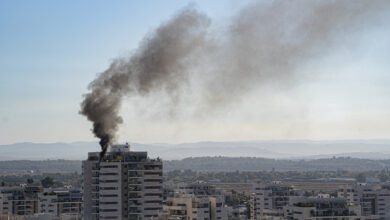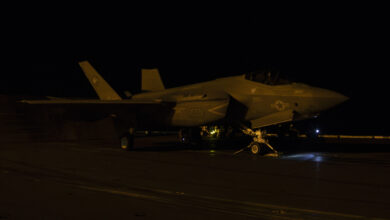Yemeni and coalition forces launch assault on critical port city Hodeidah
Yemen army backed by UAE and Saudi Arabia begin 'Golden Victory' to recapture the city from Houthi rebels
Yemeni forces backed by a Gulf coalition launched an assault to recapture the key Red Sea port city of Hodeidah, despite attempts by the United Nations to broker a ceasefire between the armed forces and Houthi rebels.
The U.N. fears that a battle in Hodeidah could be devastating for the estimated 600,000 people still living in the city.
Yemen’s government media office said the “military operation to liberate the city of Hodeidah” had begun early on Wednesday, June 13.
Troops loyal to the government began to advance towards Hodeidah airport around 1:15 p.m. local time (1015 GMT) after receiving the ‘green light’ from the coalition, AFP reported. Fighting in the morning appeared confined to the port itself with airstrikes on the outskirts of the city.
The operation, named Golden Victory, was expected after the U.K. Department for International Development told aid agencies on Sunday that “the Emirates have informed us today that they will now give a 3-day grace period for the U.N. to leave the city.”
Armed forces on the ground are backed by an air campaign led by Saudi Arabia and the United Arab Emirates. Yemeni journalists reported warplanes flying over the capital Sana’a, about 150 km (93 miles) northeast, on Wednesday morning.
Yemen’s lifeline
Riyadh accuses the Houthis of using Hodeidah to smuggle weapons. The city has been Yemen’s main humanitarian lifeline since the conflict began in 2015. The coalition of mainly Gulf nations intervened in the war in 2015 in support of forces loyal to President Abd-Rabbu Mansour Hadi.
Last week, U.N. Yemen envoy Martin Griffiths urged the Houthis to hand over Hodeidah to U.N. control in an attempt to prevent an assault on the city.
The U.N. has warned that a military operation will threaten tens of thousands of civilians.
“In a prolonged worst case, we fear that as many as 250,000 people may lose everything – even their lives,” Lise Grande, the U.N. Humanitarian Coordinator for Yemen, said last week.
“We have asked our staff to stay at home today,” Mohamed Abdi, Norwegian Refugee Council country director for Yemen, told The Defense Post. “The situation here is very tense.”
The NRC had been able to access some districts in the north of the city, where it is aiming to help about 6,000 people in need of aid.
Some international aid agencies have begun pulling staff from Yemen, with the International Committee of the Red Cross saying this week that it sees “a vigorous attempt to instrumentalize our organization as a pawn in the conflict.”
Hodeidah is a critical point for almost 80 percent of aid entering Yemen, which is in a situation the U.N. has called the world’s worst humanitarian crisis. Hodeidah handled 70 percent of the nation’s food imports before the war, and periodic Saudi blockades of the port since 2015 have heightened fears of famine in a country where some 22 million people are in need of humanitarian aid.
“The liberation of Hodaydah will allow the full utilization of the capacity of its port back to the levels of 2014, it will also enable further expansion of the port’s capacity,” Mohammed Al Jabir, Saudi Arabia’s ambassador to Yemen, tweeted on Wednesday.
The UAE has said that an operation can be carried out quickly and that the coalition will keep the port open.
“Cutting off imports through Hodeidah for any length of time will put Yemen’s population at extreme, unjustifiable risk,” Grande said last week.
This story was updated on June 13 at 1055 GMT with additional information.












